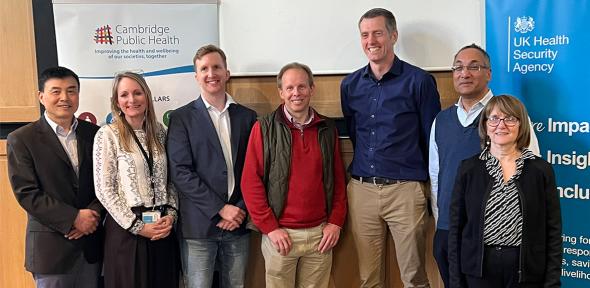
Submitted by Anonymous on Thu, 03/04/2025 - 11:45
On 2 April, Cambridge Public Health co-hosted Tomorrow’s Health Today: AI and Data Science Explained with the UK Health Security Agency (UKHSA). The interactive panel discussion, held as part of the Cambridge Festival, explored the real-world applications and limitations of artificial intelligence (AI) in health and care.
Held in the Bateman Auditorium at Gonville & Caius College, the event brought together leading experts from the University of Cambridge and UKHSA to examine how AI is shaping diagnostics, disease forecasting, hospital operations and responses to public health emergencies.
Chaired by broadcaster and The Naked Scientists founder Dr Chris Smith, the session aimed to demystify AI for a non-specialist audience, with public participation central to the format.
Among the topics discussed:
Using AI in clinical imaging: Professor Raj Jena (Department of Oncology) demonstrated how homegrown AI tools at Addenbrooke’s Hospital are already reducing treatment delays for cancer patients by automating parts of radiotherapy planning, allowing oncologists to focus on more critical tasks.
AI in epidemic forecasting: Professor Daniela De Angelis (MRC Biostatistics Unit) reflected on the limitations of existing models during the COVID-19 pandemic and outlined the need for real-time, geographically specific forecasting tools to support faster, more targeted public health interventions.
Trustworthy machine learning: Dr Paul Kirk (MRC Biostatistics Unit) raised the importance of designing AI systems that can express uncertainty. Rather than always producing an answer, he argued, systems should be able to say when they’re not sure—an essential safeguard in clinical decision-making.
Data governance in emergencies: Professor Steven Riley (UKHSA) asked how the public would want their health data used in a future crisis. “How do you want your data used in the next emergency?” he asked. “That’s a conversation we need to have now—not during the crisis.”
Personal data in prevention: Professor Angela Wood (Department of Public Health and Primary Care) discussed how combining clinical, environmental and social data could support earlier detection of chronic disease—but also raised questions about how comfortable people might be with sharing their personal details such as housing type or heating systems for this purpose.
Improving NHS operations: Professor Houyuan Jiang (Judge Business School) outlined how AI and operations research are being applied to optimise patient flow, reduce waiting times and enhance the coordination of trauma care in the NHS.
Audience members played an active role throughout, prompting lively discussion around the practical, ethical and regulatory challenges of applying AI in health. While its potential was widely recognised, several concerns emerged.
One was the quality and consistency of the data that drives AI systems—particularly the variability in GP records and free-text clinical notes. Since AI is only as good as the data it learns from, these inconsistencies raise important questions about accuracy and trust.
Another was the fact that health data isn’t static. As clinical practices and records evolve, so too must the models built on them. Without regular updates, even the best AI risks becoming obsolete.
Above all, the discussion reinforced a central point: understanding what AI can’t do—where it falters and when it should say “I don’t know”—is just as important as celebrating what it can achieve.

